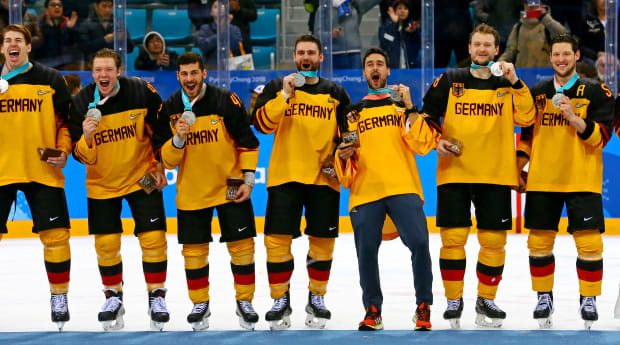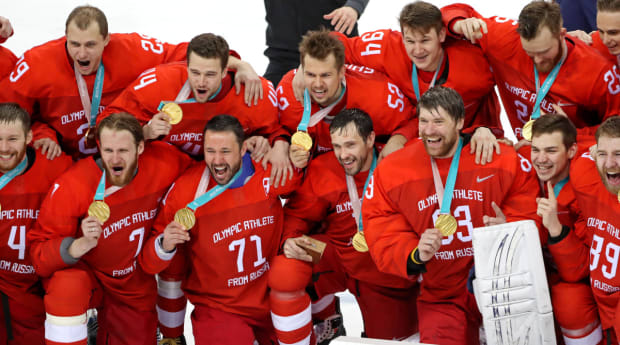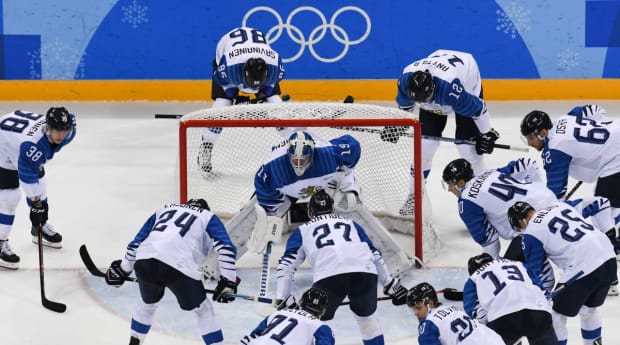After the NHL withdrew its participation in the Olympics, men’s ice hockey tournament took the form of a giant question mark at this year’s Winter Games. With about a month to name an official lineup, how does a country form a roster with little preparation and abundant unpredictability? What would those rosters even look like? And how much intrigue would remain?
Days before the men’s tournament begins, some of those questions have been answered. Teams like the Czech Republic and Finland prioritized experience. The United States went in the opposite direction, leaning into the unknown by relying on an infusion of young talent. Canada split the difference.
With no NHLers, parity reigns. The Russian Olympic Committee and Finland are the tournament’s two top teams. Sweden, Canada and the Czech Republic form a group of strong medal contenders, but they’re part of a larger anything-can-happen tier with Germany, the U.S., Switzerland and Slovakia. The 2018 PyeongChang Games already showed that a country like Germany, which won just one game in group play, can surprise and make a gold medal run.
The men’s action starts on Wednesday with the ROC facing Switzerland at 3:40 a.m. ET. Twelve countries are divided into three groups. Every country plays each member of its group once in the preliminary round, receiving three points for a regulation win, two points for an overtime win, one point for an overtime loss and zero points for a loss. The top team from each group, as well as a fourth team with the next highest amount of points, receives a bye from the playoff round, where the knockout stage begins. All 12 countries will have a chance to fight through the bracket to reach the finals. Only one will win gold.
With that in mind, here is a group-by-group breakdown of each country competing at the 2022 Olympic men’s ice hockey tournament in Beijing.

David E. Klutho/USA TODAY Sports
Group A — Canada, United States, Germany and China
Canada: General manager Shane Doan opted for a mix of youth and experience, selecting players at both extremes and filling out Canada’s roster with skaters who fall somewhere in the middle. At one end, 2021 No. 1 pick Owen Power might already be the most talented defenseman on Canada’s blue line. Power, 19, leads all NCAA defensemen with 26 points through 24 games. He’s joined by 18-year-old center Mason McTavish, the Ducks’ No. 3 pick in ‘21, and 20-year-old goaltender Devon Levi, who leads Division I with nine shutouts and should vie to be Canada’s starter.
At the other end, six-time All-Star Eric Staal, 37, has nearly two decades more experience than Power. He was on Canada’s taxi squad for the 2006 Games and won gold in Vancouver in ‘10. Staal’s 1,293 career NHL games are followed by fellow teammates Daniel Winnik (894), Jason Demers (699), David Desharnais (524), Mark Barberio (272) and Adam Cracknell (210).
As for the rest? Former first-round picks Josh Ho-Sang and Brandon Gormley received Olympic nods alongside six-year NHL veteran Jordan Weal and Corban Knight, whose 48 points are third-best in the KHL.
Canada’s roster is balanced, however, the team was put in an odd position when coach Claude Julien slipped on the ice and fractured his ribs during a pre-Olympic practice. With Julien unable to travel to Beijing, former Blackhawks coach Jeremy Colliton took his place. He’s keeping Julien’s system intact, but now Canada enters the Winter Games with less experience behind the bench. Canada might need a career-defining performance from Levi or 2020–21 KHL Goaltender of the Year Ed Pasquale to strengthen its gold medal hopes.
Germany: Four years ago at PyeongChang, the Germans took silver for the first time in the nation’s history despite winning just one game in group play. They return 10 Olympians from that team and add three former NHLers (Korbinian Holzer, Tobias Reider and Tom Kuhnackle). Germany will also carry over 19 players from the squad that placed fourth at the 2021 World Championships, albeit without Calder Trophy candidate Moritz Seider. Without any defining strengths or glaring weaknesses, this team is good enough to be a thorn in its opponent’s side.
United States: While most countries tapped their own national leagues for talent and eschewed youth, Team USA raided the collegiate ranks and formed its youngest Olympic team since 1994. Forward Matty Beniers and defenseman Jake Sanderson—two teenagers, both top-five picks in the previous two NHL drafts—headline a U.S. team with 15 active college athletes and only one returning Olympian. Entering the Games, the U.S. is one of the bigger unknowns in the tournament.
Team USA lacks the top-end, veteran talent compared to the ROC and Finland, and it doesn’t have much recent chemistry or history to fall back on. Head coach David Quinn will try to make up for that with an up-tempo, high-pressure style of hockey. In lieu of a medal, that might help the team become something else: fun. The U.S. carries no burden of expectation and is free to let its college stars shine on the world stage.
China: Ranked 32nd in the world, China’s men’s team earned automatic qualification by virtue of being the host country for the Winter Games. Even then, China was almost replaced by Norway over concerns that the host country wasn’t good enough to compete. The IIHF ultimately ruled in China’s favor, and now every player on its Olympic squad plays for the Kunlun Red Star, a Beijing-based KHL team that ranks dead last in Russia’s premier hockey league. More than half the roster is foreign-born, including its captain, former Avalanche winger Brandon Yip, and Jake Chelios, the son of Hall of Famer Chris Chelios.

Geoff Burke/USA TODAY Sports
Group B — Russian Olympic Committee, Czech Republic, Switzerland and Denmark
ROC: With less than five months before the Olympics, the Russian Hockey Federation opted for change over fine tuning. Alexei Zhamnov, who has little coaching experience, replaced 12-year KHL coach Oleg Znarok as Russia’s bench boss. Since then, the ROC has fallen under the tactical guidance of assistant coaches Sergei Gonchar and Sergei Fedorov. Gonchar’s influence was felt almost immediately: Russia’s defensemen initiated quick transitions and were more active and aggressive with and without the puck in the offensive zone at the Channel One Cup in December—a dress rehearsal for the Winter Games. Russia finished second, losing 3–2 to Finland despite resting several of its starters.
There’s no denying that the ROC looks like the tournament’s toughest team on paper, but it lacks sharpshooters and playmakers. The offense is built to win off pressure. Still, only the Finns have a top line to rival the ROC. KHL points leader and team captain Vadim Shipachyov will likely be flanked by recent NHLers Nikita Gusev and Mikhail Grigorenko, while 6’ 7” Ivan Fedotov will likely start in goal after a standout performance at the Channel One Cup. An aging Vyacheslav Voinov, who was suspended for a year by the NHL for a domestic violence incident, leads the back-end alongside a mix of offensive-minded and stay-at-home defensemen. (Voinov pleaded no contest to a misdemeanor charge of corporal injury to a spouse in 2015; the conviction was dismissed by a judge in ‘18.)
There’s a reason why the defending gold medalists return as favorites, but the ROC isn’t bulletproof.
Czech Republic: Unlike the ROC, any medal for the Czech Republic would be a welcome feat. The 2018 team went undefeated in group play before ultimately losing in the bronze medal game. Since then, the Czech Republic has made a habit of winning early and tapering off. The Czech men’s team has a combined 17-0-4 (12-5-0-4) record in preliminary round games at the last three World Championships, only to make it to the semifinals once. One-time Stanley Cup winners David Krejci and Michael Frolik are hoping to buck that trend and help the Czech Republic end a streak of seven consecutive international losses.
Switzerland: Switzerland will err on the side of experience, returning almost two-thirds of its team that placed sixth at the 2021 Worlds. Every player comes from the Swiss National League, including 38-year-old Andres Ambuhl, who will become the 13th player—in men’s or women’s hockey—to participate in five different Winter Games. The Swiss squad is hoping to recapture the magic of its silver at the ‘18 Worlds and is betting on continuity in a tournament filled with uncertainty.
Denmark: That leaves Denmark, which will take Olympic ice for the first time in 75 years in Beijing. Jets winger Nikolaj Ehlers scored nine points in three qualification games but the Danes will be without their top forward—a blow for a team that has averaged 1.5 goals per game at the last two World Championships. Denmark will instead turn to NHL alumni Frans Nielsen and Mikkel Boedker and hope for a scoring infusion from Nicklas Jensen, who ranks ninth in the KHL with 19 goals. While goaltender Sebastian Dahm has a steadfast 1.98 goals against average in his last 11 international games, Denmark’s lack of firepower renders the Danes spoilers rather than a darkhorse.

Kelvin Kuo/USA TODAY Sports
Group C — Finland, Sweden, Slovakia and Latvia
Finland: Meidän Peli—which translates to “Our Game”—has become Finnish hockey’s religious credo, and national team coach Jukka Jalonen is its chief preacher. At its core, Meidän Peli revolves around total cooperation and teamwork. It’s a developmental philosophy—one that unites club and national team under shared principles and guidelines—but it’s a tactical approach, too. The Finnish system is predicated on reading and reacting to the game as it unfolds, while the collective five-man unit asserts itself on the opponent through dominant puck control. It’s structured and defensive, a rebuttal of modern hockey tailored to individualism and creativity.
Since 2009, Jalonen has succeeded at almost every level. He won bronze at the ‘10 Vancouver Games and took gold at the ‘11 and ‘19 World Championships. The coach also seized gold at the ‘16 World Juniors, expanding his system to give more freedom to talented players like Mikko Rantanen, Sebastian Aho and Patrik Laine. It’s no surprise that Blue Jackets GM Jarmo Kekäläinen considered Jalonen for the Columbus job. Jalonen, and his system, represent Finland’s greatest advantage in Beijing and place the Lions next to the ROC as the two best teams.
The roster, one of the oldest at this year’s Games, is good, too. Eight-year NHL vet Markus Granlund, center Sakari Manninen and winger Teemu Hartikainen scored 70 goals together with the KHL’s Salavat Yulaev Ufa last season and will return as Finland’s top line. The offense also features former NHLers Leo Komarov and Valtteri Filppula, while the blue line is headlined by NHL alumnis Sami Vatanen and Mikko Lehtonen. In net, 32-year-old Harri Säteri, who had a .955 save percentage and 0.95 goals-against average at the 2021 Worlds, is expected to start for Finland.
Simply put: There’s no team in Beijing that can match Finland’s combination of identity, chemistry and talent.
Sweden: The Swedes suffered an uncharacteristic defeat at the 2021 Worlds, missing the playoff round and losing to Belarus and Denmark in the process. The Tre Kronor rebounded in November and dominated the Karjala Cup—an annual round-robin tournament between Sweden, Finland, Russia and the Czech Republic—with a roster almost identical to its Olympic counterpart. Since then, the team brought on former NHLers Marcus Krüger and Lucas Wallmark. They will take a back seat to Sweden’s top line of Carl Klingberg, Anton Lander and Mattias Bromé.
The Swedish Olympic squad favors grit over flash. A grind-it-out approach can work because Sweden enters Beijing with the tournament’s best goaltending triad. Lars Johansson, the likely starter, leads the KHL with a 1.63 goals-against average and ranks second with a .932 save percentage. He’s backed up by Magnus Hellberg, another top KHL netminder, and Adam Reideborn, who had a stellar performance at Worlds last spring. Sweden just needs to score enough to let their goalies do the rest.
Slovakia: With the golden era in its past, Slovakia’s roster offers a glimpse of the future and reflects a desire to regain its status among the world’s elite. Under Canadian coach Craig Ramsay, Slovakia reached the World Championship quarterfinals for the first time in eight years last June. There, 26-year-old Peter Cehlárik tied for the tournament lead in points and will be on Slovakia’s top line, centered by former Ranger Marek Hrivík, in Beijing.
The most exciting aspect of Slovakia’s roster comes in the form of two teenagers, both potential 2022 top-five picks. Up front, Juraj Slafkovský, a power forward, is considered Slovakia’s best offensive prospect since Marian Gaborik. Defenseman Šimon Nemec is a skilled passer whose playing style has drawn comparison to one-time Norris Trophy winner Roman Josi. Slafkovský, 17, and Nemec, 18, will become the youngest Olympians to suit up for Slovakia’s men’s national team.
The program has made gains since the Slovak Ice Hockey Federation’s political reformation, but these Olympics will be a case test for just how far Slovakia has come.
Latvia: After stunning the Swiss and nearly doing the same to Canada in the quarterfinals at the 2014 Sochi Games, Latvia has struggled to make a dent on the international stage. Even with new coach Harijs Vītoliņš, who won gold as an assistant with the ROC in ‘18, Latvia’s fortunes aren’t likely to change at this Olympics. Several of its top forwards—Lauris Dārziņš, Kaspars Daugaviņš, Rodrigo Ābols, Nikolajs Jeļisejevs and Miks Indrašis—have had moderate success, at times, across several European leagues. Blueliner Uvis Balinskins has been one of the best defenseman in the Czech Extraliga and players like 24-year-old Mārtiņš Dzierkals offer upside, too. But, the Latvian squad has no goaltending to fall back on. That’s where Latvia will feel the absence of Elvis Merzļikins, making a win in the qualification round playoffs a tough ask.
• Inside Beijing's Closed Loop at the Winter Olympics
• The Mysterious Case of the Missing Luge Equipment
• SI Picks Every Medal at the 2022 Olympics







